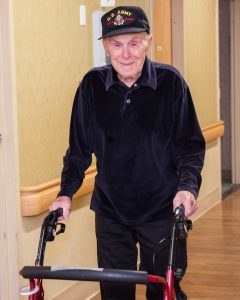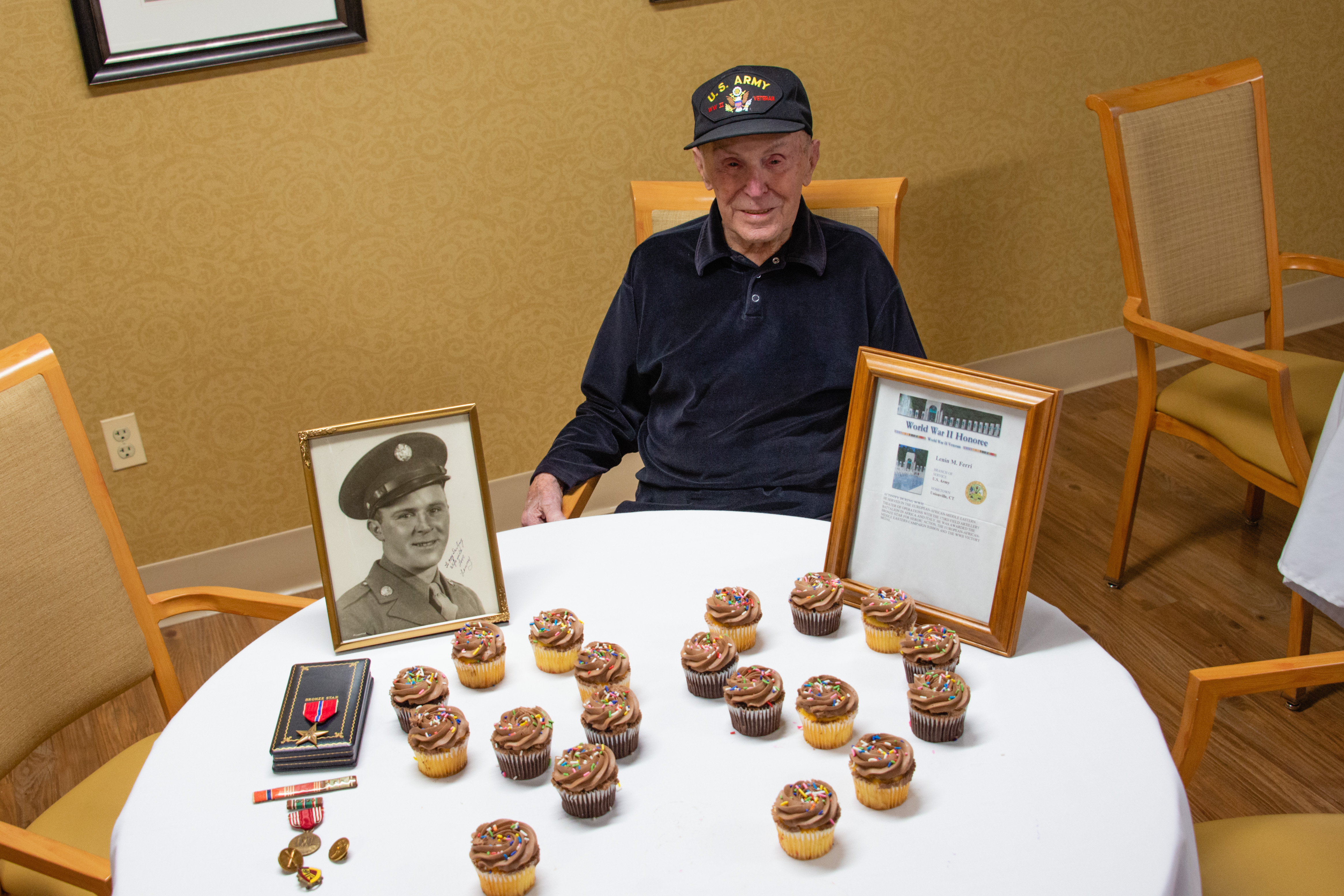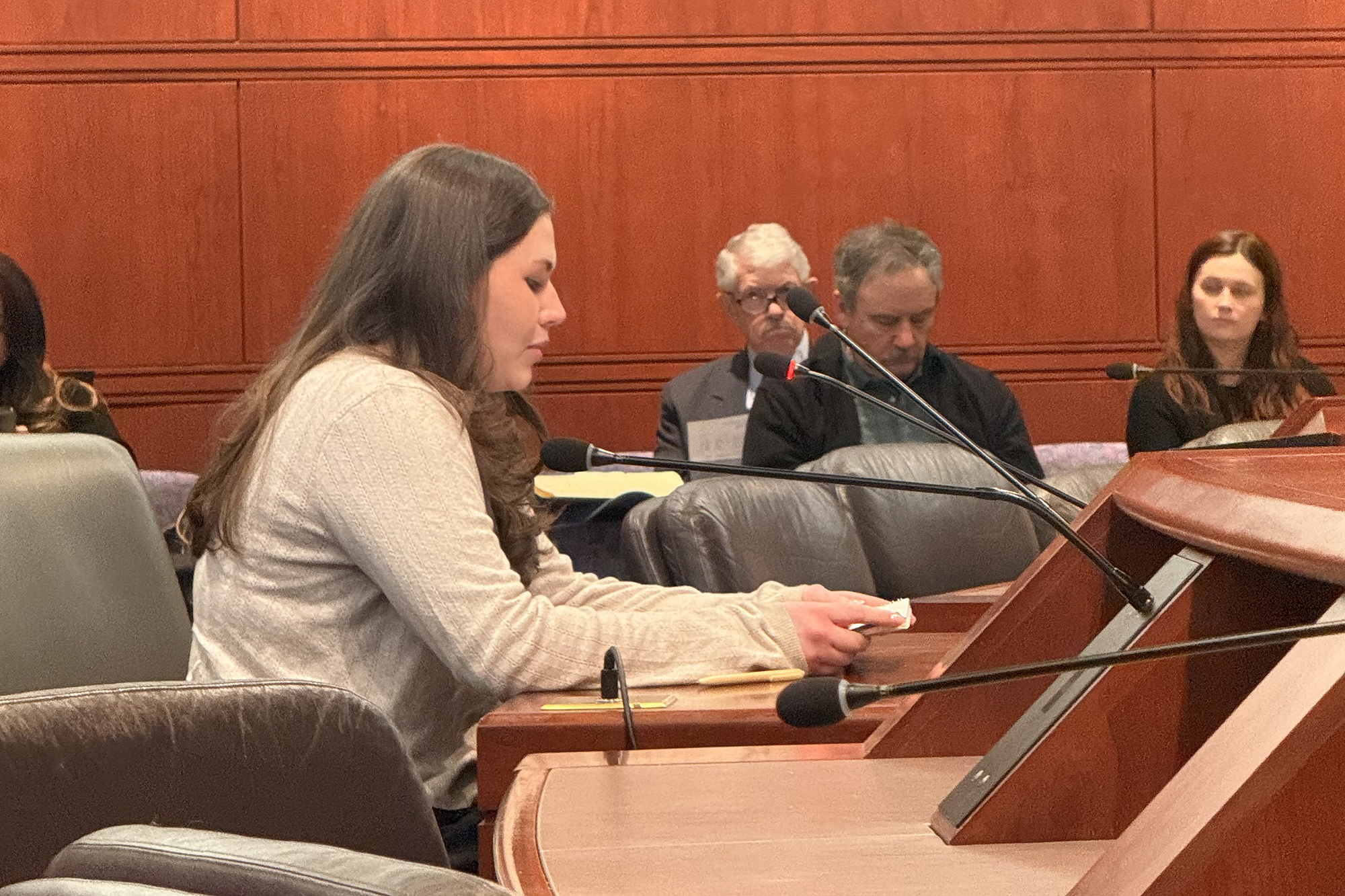
At age 99, Lenny Ferri is the very model of successful aging.
A decorated World War II veteran, Ferri was still working at age 96 – as a handyman at the apartment complex where he’d been living. He didn’t stop driving until that same year.
Only recently did he move in to the Avon Health Center, where he remains sharp, vibrant, and active. He exercises daily, and when the weather allows he brings a boom box outside and plays big band music for the other residents. Observe him greeting the other residents as he makes his way through the complex and you might think he’s running for mayor.
“I don’t have any secrets,” Ferri says when asked about his longevity. “I just enjoy having a good time all the time, that’s true, and I really can’t tell you exactly. I just take it one day at a time. I always did.”
Ferri “aged in place,” meaning he lived independently in the community, until age 97. After being hospitalized with a broken hip, he was discharged to the Avon Health Center for rehabilitation. Because of care needs he ended up moving in.
Under the care of Dr. Jaclyn Olsen, a UConn Health geriatrician who sees patients daily at the Avon Health Center, Ferri regained his mobility and has been able to stay out of the hospital.
Olsen is what’s become known as a transitionist, a physician who, in this case, oversees the transition of care from UConn John Dempsey Hospital to the Avon Health Center and becomes the patient’s attending physician of record during his or her post-acute care.
“Transitions of care are very vulnerable times for any patient,” Olsen says. “But when you consider the medical and social complexity of an older adult, add a hospitalization which typically results in a new treatment plan with new medications, and ultimately discharge the patient to a new care environment, the opportunity for errors or breakdown in communication is unfortunately large.”

Every week in the U.S., about 70,000 people turn 65. And while people are getting older and their medical needs are getting more complex, hospital stays generally are getting shorter. Often patients are discharged before they’re well enough to go home, and a skilled nursing facility is their next stop.
“We’re recognizing that treating an 89-year-old man’s pneumonia is important, but what also needs attention is when that same 89-year-old man who was living independently prior to his hospitalization can’t get out of bed to use the bathroom by himself due to deconditioning,” Olsen says. “Discharging that person home is not always a good care plan, so the interdisciplinary team and I figure out how to make that transition better.”
The transitionist’s role emerged from medical systems’ growing acceptance of the complexity of a transitioning patient’s care and the value of the continuity of care. At UConn Health, this has drastically reduced the rate of geriatric readmissions. In the second quarter of 2018, that rate was zero, meaning not a single geriatric patient discharged to the Avon Health Center under Olsen’s care was readmitted within 30 days.
“That’s really a testament to UConn’s quality transitional care and inpatient programs and the quality of the care at Avon Health Center,” Olsen says. “The enhanced communication for all of the players in the health system is key. I think our shared achievement speaks to the team-based approach that is imperative for successful transitional care for vulnerable older adults.”

A successful transition involves coordination with the case manager, nursing staff, and therapy staff at both facilities, and regular communication with hospitalists and subspecialists about matters such as:
- Why the patient is on a particular medication as opposed to a different one.
- When the patient will need to follow up with a specialist.
- What additional assistance or support the patient might need during his/her recovery.
- Any acute issues that should be known as the patient is getting ready for discharge.
- Other details about what the patient already has gone through and what he/she might need at the skilled nursing facility.
“I find the whole transitional care process fascinating,” Olsen says. “My job is to enhance the communication between the patients, families, hospital, skilled nursing facility, and outpatient providers, provide high-quality geriatric medical care, and manage all of the moving pieces in a very complicated puzzle with an interdisciplinary team. Those are really my primary roles.”
Ferri represents the patient who benefits from a transitionist’s care. And now that the weather is nicer, you’re likely to find him outdoors, wearing his U.S. Army hat, playing bocce or spinning some Sinatra.
“He’s amazing,” Olsen says. “His outlook on life is just so positive. He’s very special.”
“I always thought anything in moderation will never hurt you,” says Ferri, who turned 99 in February. “And I still believe it.”
More information about the UConn Center on Aging is available at health.uconn.edu/aging.



